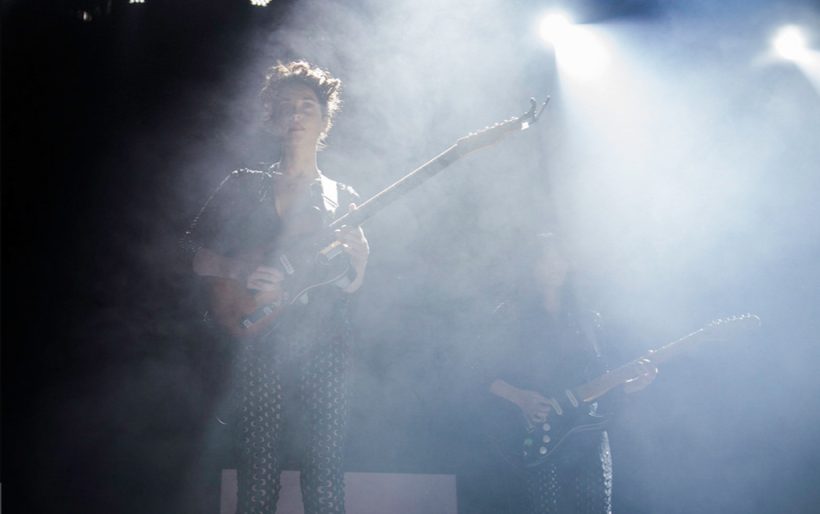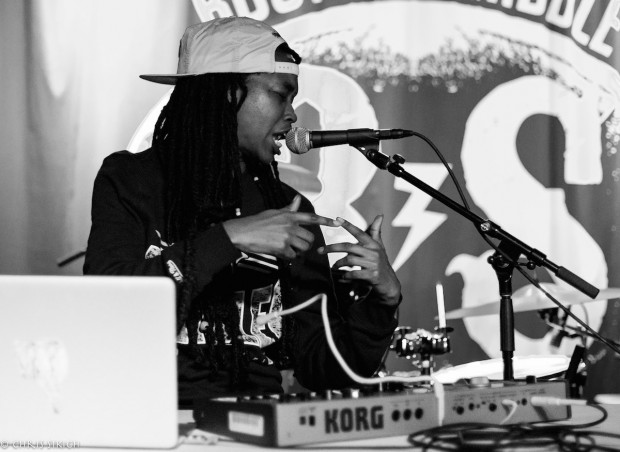
St. Vincent | Photo by Rachel Del Sordo for WXPN | racheldelsordophotography.com
Shifting the Gaze: Why talking about women in music is as important as ever
“The days of going to shows that feature no women and no trans artists, that feature all male lineups, is over,” says Camae Ayewa. The experimental Philly musician at the head of Moor Mother Goddess has seen the scene evolve since she co-founded the all-inclusive ROCKERS! concert series in 2005. But, she says, “We have a long way to go.”
Tomorrow night, Ayewa is one of the panelists at UPenn’s Kelly Writers House for Shifting the Gaze: Women in Music, a roundtable examination of an industry that has historically been an exclusionary boys’ club. In a sense, women are more prominent in the music sphere than ever before, from top bill artists St. Vincent and Grimes to a plethora of emerging acts like All Dogs and Cayetana. Last year, Portland power trio Sleater-Kinney went on a reunion tour and released the album No Cities to Love – both were rallied around at a near-universal degree.
So, why do we still need to talk about women in music in 2016? As if on cue, a high-power music industry publicist stepped down from his post last week after a series of women, beginning with Amber Coffman of Dirty Projecters, shared their stories of his alleged sexual misconduct towards them. The playing field evidently isn’t so equal after all.
“I feel like we’ve made a lot of progress when it comes to women being able to speak out about this kind of stuff,” says Cynthia Schemmer. “But then, no we haven’t.”
Schemmer is a journalist who reports on music for Impose (among other media outlets) and edits the guitar magazine She Shreds. She’ll moderate the Shifting the Gaze panel tomorrow night, and explains that there are still obstacles women face, particularly in music.
“For a long time, we worked for visibility,” Schemmer says. “And now we’re there. We have the visibility, we’re out there. Nobody can say women don’t play music. Now it’s stuff like this – women are still being assaulted by [men in the industry]. And they’re scared to speak up, it’s basically their career on the line. How can we change this?”

Moor Mother Goddess | Photo by Chris Sikich for WXPN | sikichphotography.com
UPenn sophomore Amanda Silberling organized Shifting the Gaze in part to address questions like this – she’s a self-described music nerd, a passionate fan and contributing writer for local site Rock On Philly – but she also looks to bring a variety of perspectives to the table. Dialogue about women in music often focuses around indie rock and punk, which is only part of the story.
Ayewa says the issue isn’t just about showcasing women, “it’s about what types of women are generally showcased. And who is in charge of booking these events. The makers of a scene are responsible…and because of the lack of diversity, multiple scenes have to be created that don’t get the support they deserve.”
“The music scene in Philly is so big,” adds Silberling. “And there aren’t so many opportunities for people who care about issues like gender or race in music to have a chance to get together and talk about making productive change in our community.”
To that end, the Kelly Writers’ House event mixes up women from different corners of the industry – Ayewa, an interdisciplinary performer; Diane Foglizzo, director of Girls Rock Philly; gear manufacturer Fran Blanche of Frantone Electronics; author Maria Raha; and Schemmer, a journalist and musician. “I wanted to invite a diverse panel of women,” says Silberling, “both in terms of their experiences and careers within the music industry.”
On one level, equality isn’t just about visibility but also perception. When I sat down for coffee with Schemmer, I related a story about last summer’s XPoNential Music Festival where My Morning Jacket and St. Vincent played back-to-back headlining sets. Both acts are fronted by remarkably talented guitarists, arguably at the same levels of skill, stature and acclaim. And even though I could observe Jim James devotees actively ignoring Annie Clark during the earlier part of St. Vincent’s set, by the end they were turned around, excited and engaged. Sure, I could laugh at their initial obliviousness, but changing somebody’s perception like that is a positive thing, right?
Schemmer shakes her head. “I think we should be past that point,” she says. “When you think of it like that, it puts women in this subgenre of ‘my favorite woman guitarist.’ Gender is important to acknowledge, but it shouldn’t be your defining factor. And I think that sometimes, that’s what that does – ‘in comparison to that dude, that lady can really shred up there.’ You’re strictly basing her abilities on her gender, and that’s where the issue lies. If [both artists] are co-headlining, why can’t [they] be at the same level?”
So what does that turning point look like? It’s not easy to say; as editor of She Shreds, Schemmer faces the dilemma of focusing on women who play guitar, without singling them out in a (lesser) subcategory of musicians. But media plays a major part, says Schemmer, and awareness of the language it uses is key.
“Media outlets need to learn how to not call bands ‘women fronted’ or ‘all-girl,’” she says. “Those kinds of things also pigeonhole us.”
They’re simply “bands,” plain and simple.
Gear companies also play a role in how they market themselves. Women are rarely portrayed in advertising for guitars, Schemmer says, and when they are, it’s usually sexualized – in bikinis, for instance. But guitar companies are slowly starting to realize how problematic this is, and Schemmer says her magazine has been approached by companies hoping to turn their image around.
“It’s a new era, quote unquote,” she says. “‘Women play guitar, we can’t treat them as pawns anymore, we have to treat them as players.'”
There’s also the element of the larger musical conversation – and how, even though this panel is looking at the state of women in music, not every musician who happens to be a woman should be expected to comment on their gender. Schemmer personally has encountered this as a solo artist, and a guitarist in Radiator Hospital and formerly Heavy Bangs.
“I do want to talk about it, but when it’s appropriate, and when it doesn’t seem like you’re trying to reduce me to a lower level,” she says. “It really depends on the context and the time and the place. If you’re interviewing me about my band and my musicianship, maybe don’t ask me what it’s like to be a woman in music.”
But women are often asked about that, or they are asked about their lyrics, or their poetry. Which is fine, Schemmer says, but it’s rare to see a woman asked about her gear or playing, or anything technical.
“I think that’s super important, because women do want to talk about that,” she says. “I’m not the most technical person in the world as far as gear goes, but I like talking about it. And I think people assume that women don’t want to talk about it or that we aren’t equipped to talk about it, but it’s like ‘no, we are! Ask those questions!’”
Silberling and Schemmer say the Shifting the Gaze panel will follow a loose structure of topics and talking points, but will be carried by however the conversation happens to flow – including a Q&A session with the audience to conclude the night. Silberling says she hopes the panel leaves attendees with a concrete idea about why diversity and inclusivity in music, and the arts in general, is important.
“I’m not expecting for everyone to walk way from the panel and immediately become an activist or anything,” she says. “But for me, a success would be if someone walked away and thought, ‘Hey, maybe next time I book a DIY show in my basement, I should make sure that the entire lineup isn’t straight, white, cis-men.'”
Shifting the Gaze: Women in Music takes place at Kelly Writers House, 3805 Locust Walk, on Wednesday night, January 27th, at 6 p.m. For those who can’t attend, the panel will be broadcast on KWH-TV, and an archive will be available after the panel at the website. For more information, go here.